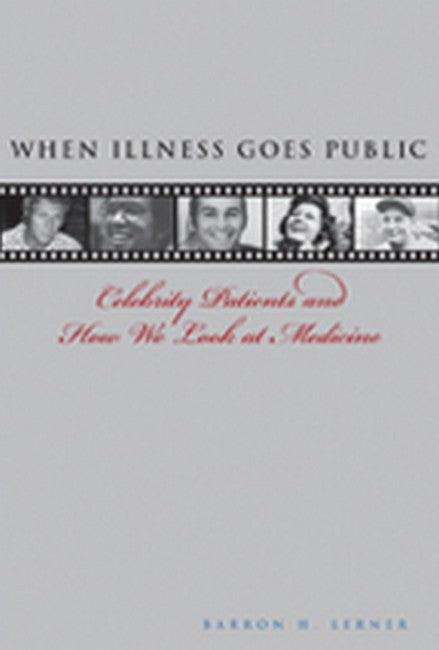Steve McQueen had cancer and was keeping it secret. Then the media found out, and soon all of America knew. McQueen's high profile changed forever the way the public perceived a dreaded disease. In When Illness Goes Public, Barron H Lerner describes the evolution of celebrities' illnesses from private matters to stories of great public interest. Famous people who have become symbols of illness include Lou Gehrig, the first celebrity patient; Rita Hayworth, whose Alzheimer disease went undiagnosed for years; and Arthur Ashe, who courageously went public with his AIDS diagnosis before the media could reveal his secret. And then there are private citizens like Barney Clark, the first recipient of a permanent artificial heart, and Lorenzo Odone, whose neurological disorder became the subject of a Hollywood film. While celebrity illnesses have helped to inform patients about treatment options, ethical controversies, and scientific proof, the stories surrounding these illnesses have also assumed mythical characteristics that may be misleading. Marrying great storytelling to an exploration of the intersection of science, journalism, fame, and legend, this book is a groundbreaking contribution to our understanding of health and illness.''In dissecting the illnesses of these famous people, Dr. Lerner brilliantly separates science from the mythologized, bravely battling celebrity. Riveting reading.''Lynn Redgrave and Annabel Clark, authors of Journal: A Mother and Daughter's Recovery from Breast Cancer''It's odd: When a celebrity falls ill, the illness becomes a celebrity, and public life democratized is made generally useful. Barron Lerner has created a fascinating book of this original observation.''Roger Rosenblatt''Celebrities yapping about what ails them wasn't always common, however, and Lerner believes that its prevalence now indicates cultural changes worth noting . . . Insightful analysis.''Booklist''A readable and thoroughly researched book. (Rated four stars: Excellent)''British Medical Journal''Lerner has created a powerful prism through his thoughtful exploration of celebrity illness, highlighting societal and cultural forces that widely affect public and private health care decisions . . . Lerner's skills are superbly demonstrated in detailing complicated stories . . . fascinating analysis.''JAMA''Lerner offers a superb volume rich with thorough and entertaining recollections and other information not previously in the public domain . . . A clear, concise, and captivating treatise that holds the interest of lay readers and yet illuminates for medical professionals issues that are important to the individual patient as well as the scientific community.''Journal of Clinical Investigation''Lerner has done a beautiful job of tracing the degree to which celebrity patients have reflected and shaped the modern American understanding of doctors, patients, and illness. This book is a pleasure to read because of its compelling storytelling and analysis.''New England Journal of Medicine''Physician and associate professor Lerner is blessed with the ability to research widely and write lucidly . . . Well documented and indexed, this highly readable book deserves a broad audience.''Choice''Interesting book, and the writing is sprightly.''Roxanna Stein, RALPH: Review of Arts, Literature, Philosophy, and the Humanities''Engaging and intriguing . . . Can be enjoyed by a broad public interested in the modern intertwining of the concerns of celebrity and health.''Steven Epstein, Isis''When Illness Goes Public says much about the development of ideas of illness in American culture.''Jasmine Gartner, Social History of Medicine''Compelling . . . We can learn quite a bit about our society, culture, and values from the way celebrities' illnesses are publicly portrayed. As Lerner perceptively demonstrates, descriptions of illness and death ultimately have as much to do with how people want to imagine these experiences as with actual events . . . Lerner is at his best when he uses his considerable narrative skills to place these stories into their broader historical, cultural and ethical contexts.''Michael J. Green, American Journal of Bioethics''In Lerner's capable hands, these dozen stories in their retelling are both colorfully dramatic narratives, ripped from the headlines (as the saying now goes) and also probing samples of historically specific contingencies and shifting attitudes.''Chris Feudtner, Bulletin of the History of Medicine''These 12 stories . . . delight and instruct readers about our own health and eventual mortality, and these are important things to know.''John C. Bailar, III, Perspectives in Biology and Medicine

